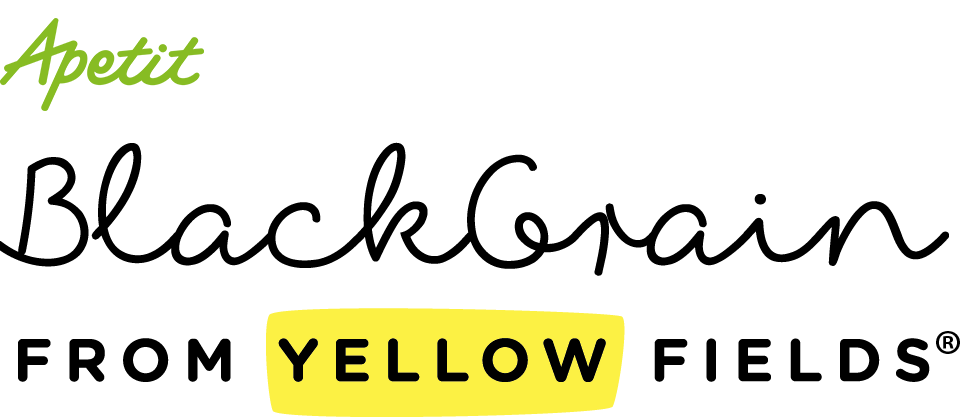Our bodies need daily doses of healthy fat for metabolism, especially the essential fatty acids omega-3 and omega-6. Besides health, fat quality plays an important role in fine-tuning the nutritional content of recipes and food applications.
Apetit’s Research and Development Manager Juha-Pekka Järvinen and former Product Development Manager Leticia Valenzuela explain why we need dietary fat, where we can get it, and what BlackGrain rapeseed powder has to offer as a healthy alternative among plant-based fats.
Dietary fat is vital for health, energy levels, and vitamin absorption
A healthy and balanced diet includes a small amount of fat helping our bodies stay warm, have energy, make hormones, and absorb vitamins A, D, and E.
– Our bodies can’t produce certain fatty acids, such as omega-3 and omega-6, on their own. As they are essential for health, they must be consumed in food, Järvinen notes.
One-third of our daily energy intake should come from fats, but not just any kind. Between unsaturated, saturated, visible dietary fat and hidden fat, some are preferable to others.
– According to The National Nutrition Council of Finland, the recommended intake of fat is 25–40% of total energy intake, of which below 10% should be saturated, 10–20% of monounsaturated fatty acids, and 5–10% polyunsaturated.
Room temperature is a sign for distinguishing saturated and unsaturated plant-based fats.
– The former consists mostly of single bonded fatty acids and is solid at room temperature, whereas unsaturated fatty acids will be in a liquid state, Valenzuela explains.
Consumers demand sustainability and high nutritional value from plant-based fats
The health benefits of replacing saturated fats with unsaturated fats are well-known, as their natural compositions are different. Among the plant-based unsaturated fats, rapeseed and olive oil stand especially strong.
– Olive oil is rich in polyphenols, which are natural antioxidants. Rapeseed oil, on the other hand, is naturally rich in both omega-3 and 6 essential fatty acids, as well as vitamins K and E. As a fat-soluble antioxidant, the latter needs fatty acids to get absorbed into the body, Järvinen points out.
The value of plant-based saturated fats has also been recognized in the food industry. The technical functionalities of tropical fats, such as the long oxidation time of palm oil and coconut oil, make them popular ingredients. Despite their convenience, they aren’t the most sustainable ingredients available.
– For today’s conscious consumers, lack of sustainability is a clear deterrent in addition to the nutritional aspects. Demanding actions for sustainable production of palm oil is therefore imperative for the food industry as well as the environment, Valenzuela adds.
Nutri-Score revelations: BlackGrain rapeseed powder improves the nutritional quality of a product
Nutri-Score is a nutritional labelling system widely used in central European countries for processed foods. It helps consumers assess how balanced products are in terms of nutritional quality.
– In the Nutri-Score criteria, favourable nutrients are weighed against unfavourable ones: total energy, sugars, sodium, and saturated fatty acids, to name a few. The scale is color-coded like traffic lights, which makes it recognizable on food packages, and easy to understand, Järvinen says.
The list of favourable nutrients is long: rapeseed, walnut, olive oils, vegetables, pulses, and nuts are all on it alongside fibre and proteins.
– Our BlackGrain rapeseed powder ticks several boxes: it’s a plant-based rapeseed ingredient with dietary fibre, plant protein, and beneficial fats in a 3-in-1 combination. Since they all increase positive points in the Nutri-Score calculation, using BlackGrain rapeseed powder in a food application makes it easy to shift towards the green light and improve the nutritional quality of the end-product!
BlackGrain rapeseed ingredients require less binding ingredients and added fat in a recipe
BlackGrain rapeseed powder contains all the health benefits that rapeseed oil has naturally. As a dry powder, the fat is in an encapsulated form, making it easy to handle the ingredient either in a blend or on its own.
– Such an upscaled ingredient is an easy way to make healthier and more sustainable products. With BlackGrain rapeseed powder, recipes can easily be fine-tuned to correspond to consumer trends of natural ingredients, well-being, and environmental consciousness, Valenzuela notes.
Wheat bread produced with BlackGrain rapeseed powder maintains its texture after several days of storage, even without an anti-staling agent – as long as a conventional white bread with additives. Fats aren’t the only reason for this phenomenon, but it’s a good indicator of their functionality.
BlackGrain rapeseed powder is especially suitable for bread, cereals, and other similar snacks, bakery and extruded food products. BlackGrain textured vegetable protein (TVP), on the other hand, is especially well suited to meat analogue and hybrid products. BlackGrain TVP consists of 20% BlackGrain rapeseed powder and 80% pea protein isolate.
– Vegetable patties made with BlackGrain TVP required fewer binding ingredients and the amount of added fat could be reduced. When the fat is tightly bound to the fibre matrix and therefore contained in the product, it gives the food product a rich mouth feeling.
Apetit’s stability studies show no negative effects on the oxidation of the oils in BlackGrain rapeseed ingredients in sensitive applications such as extrusion.
– The oxidation levels in the tested food applications like breakfast cereals and snacks, are comparable to products produced without BlackGrain rapeseed ingredients, Valenzuela concludes.
Do you have an idea for the next plant-based food phenomenon? Get in touch!


